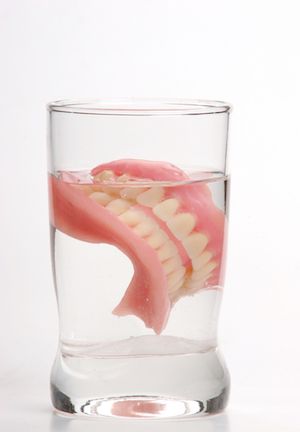When you lose all of your teeth, dentures are the perfect next step! Full dentures are a complete set of false teeth that replace all of your natural teeth while partial dentures are a set of fake teeth that fill in the spaces left by missing teeth. If you're not sure which type of denture is right for you, keep reading to learn more about the differences between full and partial dentures.
And, if you need help deciding which option is best for you, be sure to visit the dentures experts at Meredith G. Davis, DDS! Dr. Davis is a seasoned dentist committed to providing the very best dentures for your unique smile. Visit our Richardson, TX dental office or give us a call today!
What's the Difference Between Full and Partial Dentures?
Dentures are removable false teeth that cover the entire upper or lower sets of your gums. They're made either out of acrylic resin (partial dentures) or porcelain/plastic (full dentures). Full dentures may be right for you if:
- You don't have any gaps left in your mouth after all of your natural teeth fall out
- All of your remaining teeth are loose enough to take out at one time
- You're facing widespread decay resulting in extractions
Even if you have just one or two teeth left, dentures are still an option for you. Your dentist will ask you to start using partial dentures after about six months of natural tooth loss, since waiting any longer can put extra stress on your remaining natural teeth.
Full dentures are very useful for replacing all of the teeth in an arch, which is especially helpful for patients who have lost all or most of their teeth at one time. If you are considering full dentures, it is important to know what they are made from and how they are constructed -- looking at them can help you decide if this is the best option for you.
What is a Partial Denture?
A partial denture is used to replace one or more teeth that have been removed due to decay or injury. Most of the time this type of treatment is connected to replacement of these teeth with either implant crowns or porcelain veneers (tooth-colored covers).
Patients who do not receive dental care for gum disease may notice changes in their gums after tooth loss. The gum tissue that once supported the teeth may begin to recede as the bone under them atrophies (thins out), eventually leaving a gap behind each tooth. The gums surrounding these gaps will continue to recede and loosen, which could result in their teeth sinking into the shrunken ridge of bone and loosening or falling out completely. These sunken areas may require partial dentures for stabilization and restoration.
Treatment Options for Tooth Loss
The ideal choice depends on several factors, such as whether you have any remaining natural teeth or how much jawbone structure is available within the area where a tooth has been lost. In some cases, your dentist may recommend removing adjacent teeth to allow room for a bridge framework that can support a replacement tooth. In other cases, a dental implant or an implant-supported crown may be recommended to replace the missing tooth.
What Happens After Tooth Removal?
After all of the affected teeth are lost, bone loss occurs rapidly unless you receive treatment for it. Bone will begin to break down within your jawbone, which can lead to decreased support for any remaining natural teeth so they become loose and more prone to decay or gum disease. It can also cause facial muscle strain or changes in the shape of your face as it adapts to relieve some of the pressure caused by these issues.
To prevent this from happening, either full or partial dentures are typically provided to maintain the health of the smile.
How Long Do Dentures Last?
While it is difficult to predict exactly how long a partial or full denture will last, they are designed for approximately five years of wear. If you take good care of them and see your dentist regularly for preventative maintenance such as cleaning and polishing, the natural deterioration of the materials used in the construction of partial dentures may not occur until after several years on your mouth. However, if issues such as gum disease cause tooth loss and bone resorption (loss), you may need additional treatment to correct these effects and restore healthy tissue levels around your teeth.
Once your false teeth have arrived, you will need to follow the instructions that came with them for insertion and care or ask your dentist what next steps to take. You may be directed to soak your new teeth in a cleaning solution overnight before you begin using them on top of your gums.
Get the Natural-Looking Dentures You Deserve at Meredith G. Davis, DDS
Dr. Davis is a seasoned dentist committed to providing the very best dentures for your unique smile.


